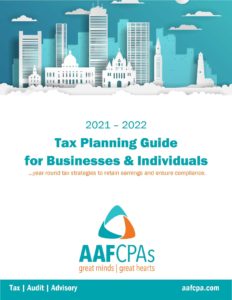Tax Planning Guides for Businesses & Individuals (2021-2022)
When considering your optimal tax planning & compliance strategy, business & individual tax payers must account for all current and impending tax code changes. This includes the 2017 Tax Cuts and Jobs Act, the 2019 Further Consolidated Appropriations Act, the 2020 Coronavirus Aid, Relief, and Economic Security Act (CARES Act) and subsequent stimulus initiatives, as well as emerging legislation proposed by new federal, state, and local executive administration.
Will Congress raise the top marginal income tax rate from 37% to 39.6%? Will it raise the capital gains tax on high-income individuals from 20% to 37%? Will the lifetime estate tax exemption decrease? And will these changes be retroactive?
Do not let this overwhelm you—and rest assured, we are here for you! AAFCPAs provides clients with peace of mind that comes from knowing we are on top of all the factors that impact your ability to minimize your tax liability. We are well positioned as your trusted advisor to ensure you make the best strategic moves available, so you do not pay a penny more than what is optimal to achieve compliance.
To help familiarize yourself and begin to identify strategies that might work for you in 2021, AAFCPAs is pleased to share our 2021-2022 Tax Planning Guide for Businesses & Individuals. As you look through this resource, we encourage you to note the sections or strategies that may apply to your situation.
AAFCPAs reminds clients that decisions made throughout the year in response to your unique challenges and opportunities have tax implications. In some cases, the tax benefits of these decisions have windows of opportunity that may close if held and only addressed at year-end. In other cases, tax consequences may be avoided or minimized with timely advice from tax council and strategic planning.
We welcome the opportunity to help you map out a tax plan that takes full advantage of all strategies available to you. Please contact us at your earliest convenience to discuss how we may help you develop a tax plan for 2021 and beyond. Most tax reduction strategies must be implemented by Dec. 31 — and some even earlier. So, the sooner the better.
AAF Wealth Management is a Registered Investment Adviser. Advisory services are only offered to clients or prospective clients where AAF Wealth Management and its representatives are properly licensed or exempt from licensure. This blog is solely for informational purposes. Past performance is no guarantee of future returns. Investing involves risk and possible loss of principal capital. No advice may be rendered by AAF Wealth Management unless a client service agreement is in place.



